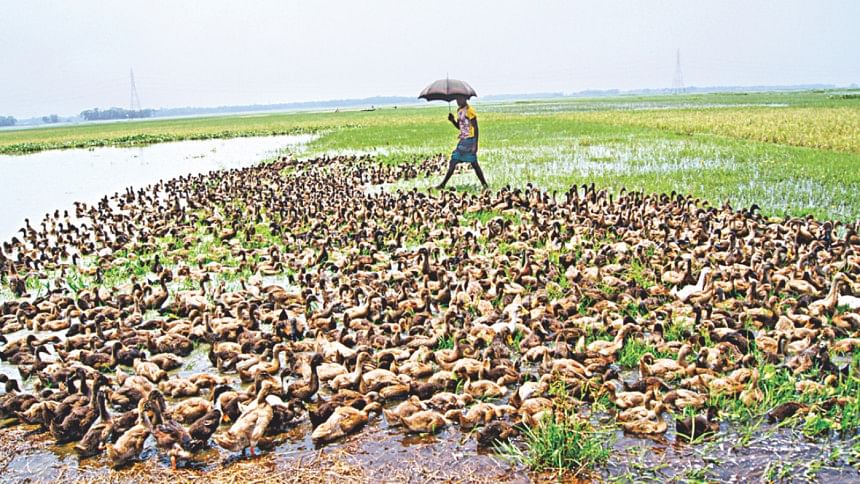A blessing for haor families

In Sylhet's Hakaluki Haor a new generation of villagers is discovering the economic potential of duck farming. Many previously unemployed people, often from disadvantaged families, have taken up the activity as a means of self-employment and a path to a better future.
“A decade ago the basic needs of our family could not be met on my father's farming income alone,” says Nasir Uddin from Chandpur village in Sylhet's Fenchuganj upazila. “I wanted to do something to help our family.”
In 2005, after completing a short training course on the subject in Derai upazila of Sunamganj district, Nasir set up a duck farm adjacent to his home. With the added income from the ducks, his dream to help support his family has come true.
Not only Nasir, but around 200 others in the area have established household duck farms, some with NGO loans for start-up capital.
“After achieving bumper profits thanks to good prices last year,” says Monur Miah, 29, of the same village, “I'm expanding my duck farm.”
“I can earn over Tk 3 lakhs annually from ducks,” says neighbour Quasem Ali.
“I started my duck farm two years ago,” says Anwar Miah, 28, of Ferighat village in Fenchuganj. “I used to be unemployed; but then I was helping out at Monir Miah's duck farm and I learnt how to do it.”
He started with 100 ducklings purchased by loan. Each duckling, just a few days old he bought for about Tk. 50, selling all after 4 months for up to Tk. 150 each. That was two years ago. “Recently I bought 8,000 ducklings,” he says. “Nowadays I am solvent.”
Similarly another neighbour, Muhon Miah, 32, says he bought 5,000 ducklings a few days ago for about Tk. 70 each. He expects to sell them after 4 months at a rate of up to Tk. 200 each.
Professor Dr. Md. Mohan Mia of the Department of Veterinary Animal Science at Sylhet Agriculture University told the Daily Star that around the world duck farming has a long tradition, with present domestic breeds derived originally from wild birds. “As those wild duck species wandered, some were domesticated due to their value as a food source.”
He says that in Sylhet these days, poor housewives and unemployed villagers are often attracted to ducks farming by the relatively low establishment costs, recognising the income potential of selling both meat and eggs.
Divisional deputy director of the livestock department Dr. Achintya Kumar Saha, says duck farming projects often prove to be profitable and sustainable. He estimates there are around 1,800 duck farms in haor areas of Sylhet Division.

 For all latest news, follow The Daily Star's Google News channel.
For all latest news, follow The Daily Star's Google News channel. 








Comments